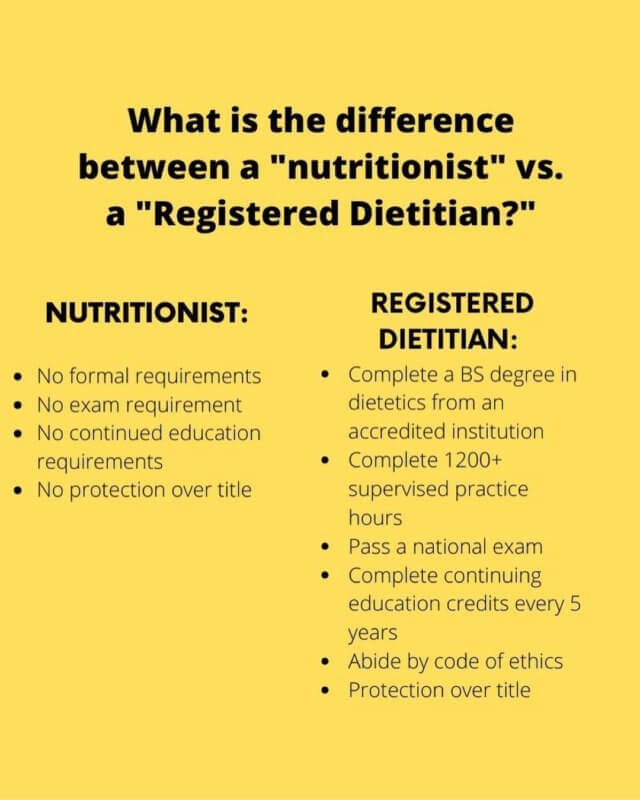All Categories
Featured
Table of Contents
The types of Nutritionists are: and. The previous are those individuals that make use of the clinical technique to research nutrients, both as individual substances and as they interact in food and nourishment while the last are specialists who assist in diagnosing the nutritional troubles of neighborhoods and in locating remedies to those troubles.
: They deal with wellness programs and global wellness organizations.: They are in charge of massive food preparation and service.: They are specialists in nutrition and aging. They are Board certified in Gerontological Nourishment with the American Dietetic Association.: They are mainly involved with dietary associated research study in the clinical element of nourishment in illness states, public element on main, secondary and in some cases tertiary health avoidance and foodservice facet in concerns entailing the food prepared for people.
What Is Full Service Plant-based Dietitian?
, and newspapers-- either as an expert visitor point of view, regular reporter or guest, or for source, dining establishment, or dish growth and critique.: These work under private method. As clarified over, all dietitians are nutritionists however not all nutritional experts have the credentials and credentials to be called dietitians.
This suggests specifically the exact same point as Registered Dietitian (RD), a term that has been in use for a long time. All RDs are RDNs however some pick to call themselves that and some do not. Additionally making complex issues are license requirements. While accreditation to end up being an RD or RDN is governed by the Academy of Nutrition and Dietetics a national organization licensure is controlled by private states.

In order to offer medical nourishment treatment and qualify as providers for insurance policy companies, a dietitian has to be licensed by the state. According to the Bureau of Labor Statistics, the demand for dietitians and nutritionists is anticipated to raise by 20% in between 2010 and 2020 this is a much faster development price than the standard for all line of work.
What Do I Need To Know To Hire A Registered Nutritionist?
There are considerable differences in settlement based upon specialization, with Medical Pediatric Dietitians and Milk Nutritionists averaging about $90,000. In 2014, The Bureau of Labor Data (BLS) discovered that the top 10% of dietitians and nutritionists earn greater than $79,000, and the bottom 10% less than $36,000 - Eating Disorder Dietitian. A mean hourly wage of $27.62 was determined for both industries, with the leading 10% earning above $38.00 per hour, and the bottom 10% earning listed below $17.00 per hour

However, there is a selection of tasks offered in various environments for those that intend to deal with the general public, in addition to for those who choose even more research-focused employment. Numerous enter into among these fields in order to help people live healthier lives which can be immensely rewarding.
With present statistics that one-third of the U.S. populace is overweight, in addition to a a great deal of elderly united state locals, dietitians and nutritional experts are likely to have a much more extensive role in the future. My Plan ranks dietitians and nutritionists at # 53 in their happiness index of leading 300 professions with the highest task fulfillment rankings.
Along with attending an approved program, many states need dietitians to be certified or to have specialist accreditation, or both. On the other hand, just concerning half of states call for such qualifications for nutritional experts. Even so, several professional duties for nutritionists telephone call for at the very least a bachelor's degree, and the same qualification is offered for nutritionists and dietitians alike.
Which Is The Best Paediatric Nutritionist Service?
Your core classes may include: Food science Chemistry Health care plan Clinical nutrition Biostatistics Microbiology Food service administration You'll likewise need to complete a dietetic internship.

Whether written in regulation or not, dietitians and nutritionists many times need a comparable education and learning. Usual bachelor's degrees for nutritionists include nutrition science or a relevant self-control, such as dietetics, kinesiology, food system management, or biochemistry and biology.
The number of hours you'll need may rely on demands in the state where you'll function. Whether you prepare to gain a credential or otherwise, it's an excellent idea to complete at the very least one internship to acquire valuable experience before seeking a full-time role. Licensing and certification requirements for nutritional experts and dietitians differ from state to state.
What Is The Best Nutritionist Software?
A specialist qualification demonstrates your knowledge and expertise in your area. These are not certificate programs. A certification suggests that you have actually taken a training program to learn a skill. Certification shows your proficiency prolongs beyond your education which you have actually passed a qualifying test. Right here are the top qualifications for dietitians and nutritionists.
The titles are basically the exact same. There's no professional difference in between them, and you're cost-free to pick which one you intend to utilize based upon personal choice. To take the accreditation test, you need to: Make an undergraduate level that's accredited by the ACEND Full a dietetics teaching fellowship After Jan. 1, 2024, you'll need to gain a master's level to get the accreditation.
Should I Hire A Professional Pressure Washing Contractor?
Bureau of Labor Statistics puts dietitians and nutritionists in the very same group and claims they make a median yearly income of $69,680. However there is a range in incomes, with the lower 10% around $44,910 and the leading 10% around $98,830, according to the BLS. Nutritionist and dietitian roles are expected to grow 6.6% via 2032, according to the BLS.
This doesn't mean that one profession is exceptional to the other, as they both have different functions and certifications that might often overlap. If you intend to discover more about what makes these careers distinct, maintain reading. Diet professionals are experts who assist enhance the lifestyle via healthy food selections.
Who Has The Best Local Dietitian?
Nutritionist suggestions regarding nourishment's effect on health and wellness. The area is much less controlled than dieticians; hence, nutritional experts' degrees of knowledge and qualifications can vary.
There are numerous distinctions in between dieticians and nutritionists. As their professions advancement, many dieticians pursue sophisticated degrees, like a Master's or Doctorate, to be experts in particular areas of nourishment.
Latest Posts
Who Is The Best Personal Trainer On Line Provider In My Area
What Is The Best Dietary Consultation Software?
Personalized Weight Loss Plan